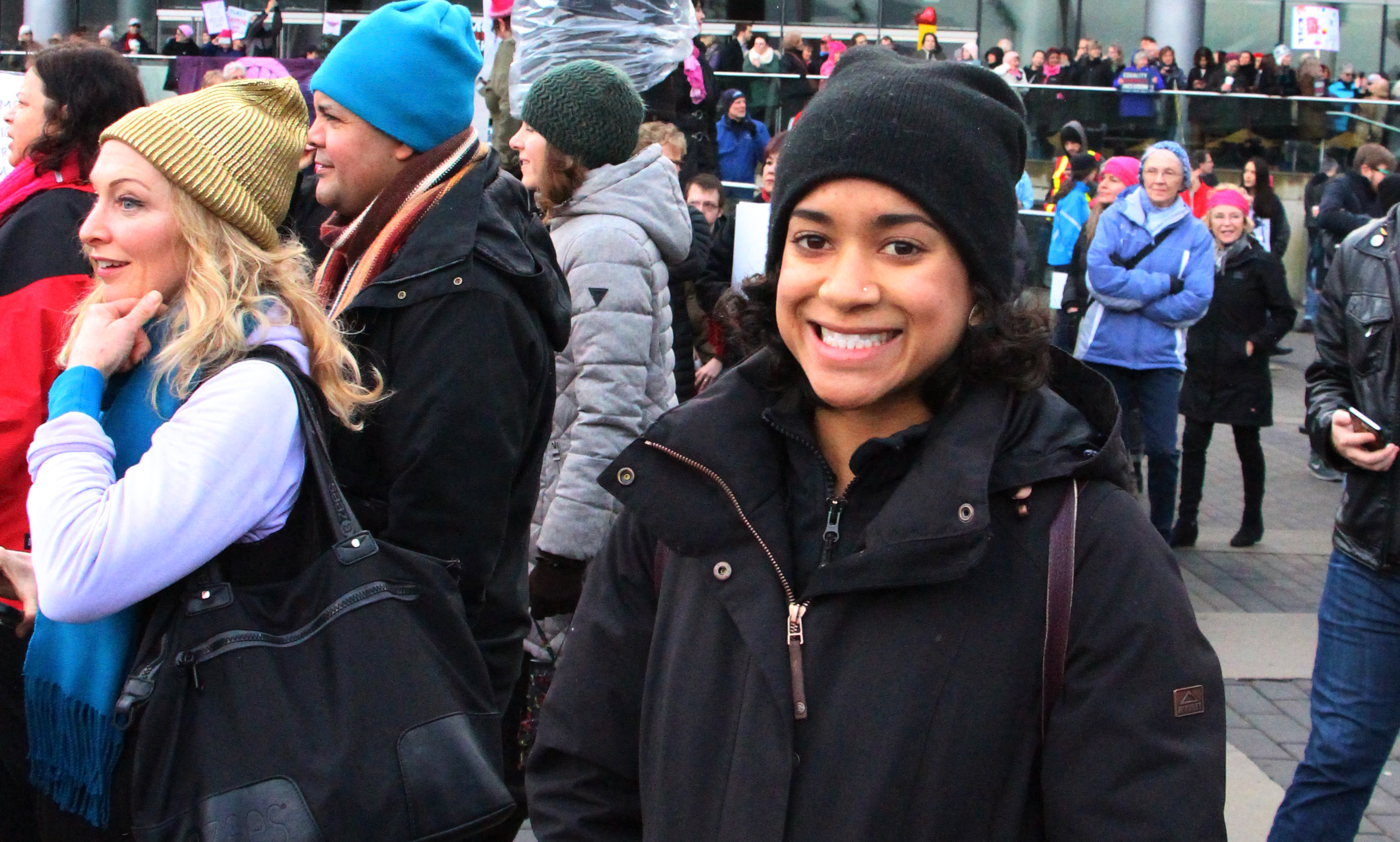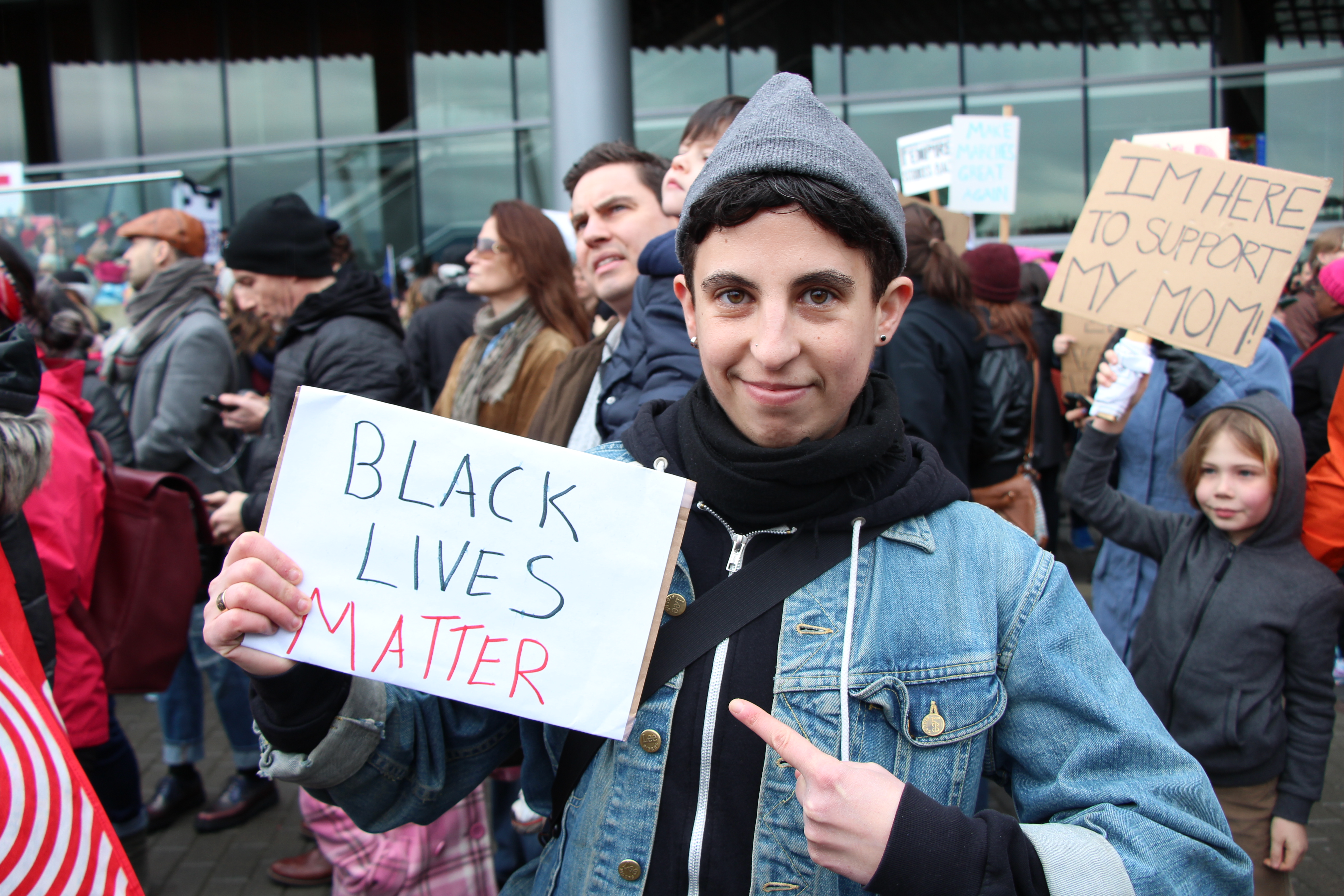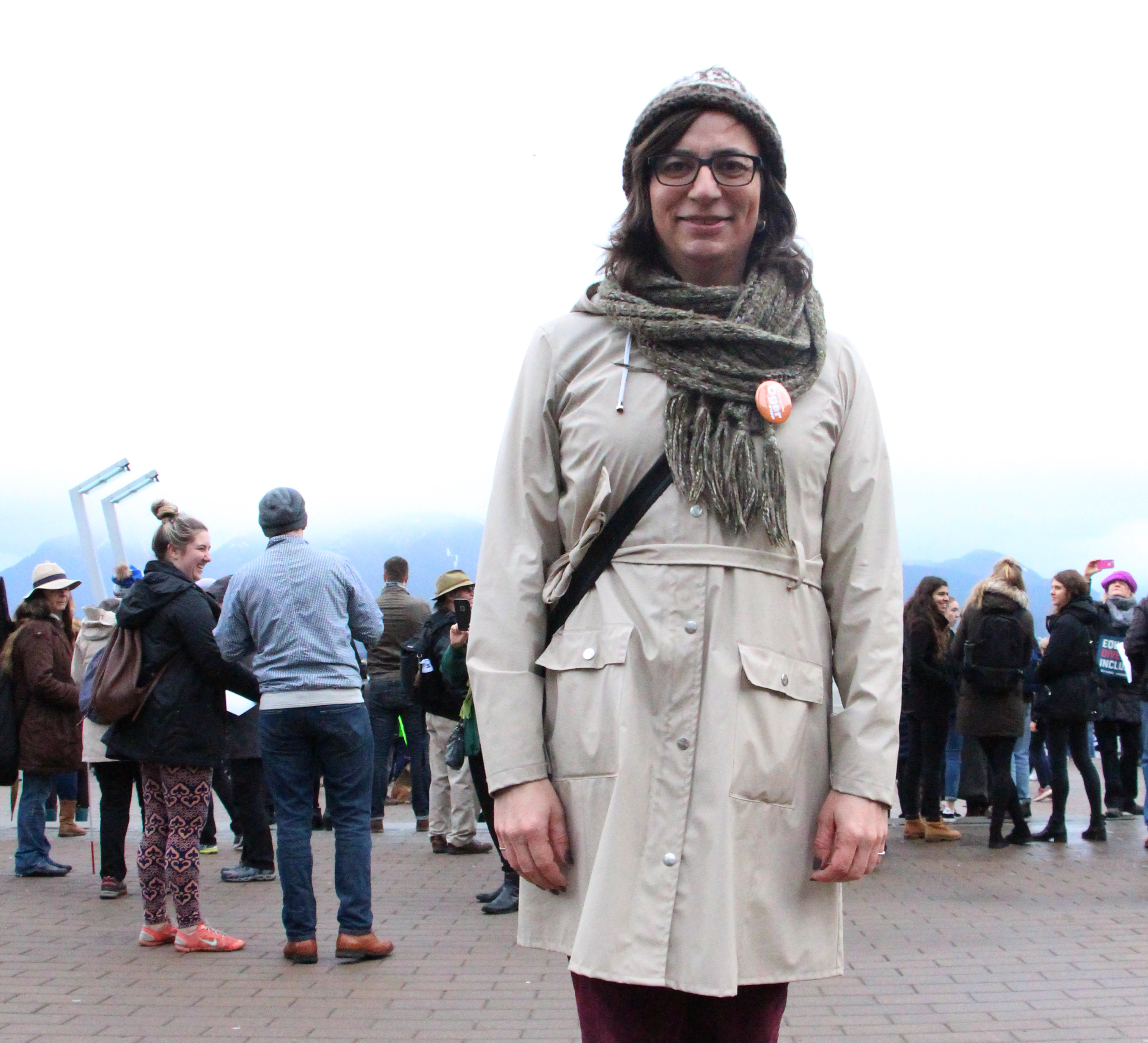Controversy over the lack of Black and trans voices at the Vancouver Women’s March on Washington has opened up a conversation about how to move forward with inclusive feminist organizing.
Organized by a group of five core volunteers, the Vancouver event labelled itself an inclusive march for all groups. The B.C. Government Employees Union estimates that as many as 15,000 people attended. However, on the night before the march, Black Lives Matter-Vancouver released a statement saying it had not received an invitation to participate and the chapter would not attend.
After the march, rabble.ca interviewed Daniella Barreto of Black Lives Matter Vancouver, who said she was concerned about the lack of Black voices on the speakers list.
“We found it concerning,” she said “for a march that was organized against oppression in the United States and was held in solidarity, [the organizers of the march] didn’t think to include members of groups that would be disproportionately affected by the new administration and changes that are going to happen in the States.”
“We noticed that there was a glaring lack of Black voices,” Barreto said. “Whether or not that was Black Lives Matter — it would make sense for us to be there — but there weren’t any of the Black activists or politicians involved in Vancouver on the speakers list and there were no trans people.”
Organizers of the march responded with varying degrees of defensiveness and regret online and in a phone interview after the march, the logistics coordinator Bodil Geyer, who is white, said organizers had reached out to Black Lives Matter.
“We didn’t actively try to profile any groups. We didn’t say ‘oh we need to make sure that every segment of inclusion is covered off.’ We put ourselves out there on social media saying…anybody who wants to be part of it, anyone who wants to help, please get in touch.”
Geyer maintains that volunteers attempted to contact Black Lives Matter directly through social media, but did not receive replies. She refused to elaborate or provide details of those requests.
In response, Barreto said different levels of social privilege between the core organizers and groups such as Black Lives Matter make it difficult for marginalized groups to reach out to the organizers.
“Offering to speak in itself requires first of all the knowledge that this is happening in Vancouver,” she said. “It’s up to the organizers who take on this position of leadership to make sure that there’s space for the most marginalized people at the table.”
Geyer said she regrets there wasn’t better communication between the groups.
“I’m deeply saddened that we didn’t have a conversation with BLM before Friday night….We could have all come together and had a conversation and this would have been avoided. A lot of this is an unfortunate set of circumstances to do with timing,” she said.
However, march attendee Shalyn Ferdinand said there was an overall lack of awareness of the Black history associated with the march.
“The original women’s march on Washington was founded by a group of Black women. I feel like this march, the original organizers, their intentions were good to include everyone, I don’t think they necessarily made a strong enough effort to invite all groups of people including the Black Lives Matter movement in Vancouver.”
“That being said I don’t think enough people at the march are aware of how the march was founded, the original organizers and the historical connection that it has to other marches.”

Mistakes could easily have been avoided
The feeling of exclusion was echoed by trans activist Morgane Oger who spoke to rabble about there being no trans people scheduled to speak.
“I think it’s sad…people from our communities should have been part of this,” she said.
Oger, chair of the Trans Alliance Society and B.C. NDP candidate for Vancouver-False Creek, said she offered to speak but was not put on the list. She also expressed concern about the lack of inclusion and recognized the organizer’s efforts.
“I think that in the zeal of organizing…it was so painful to see this man get away with this garbage, that [the organizers] threw a number of people under the bus by accident and this mistake could so easily have been avoided. Of course they have the very best of intentions.”
Transgender activist Lisa Kreut posted publicly on Facebook about her pain of exclusion.
“I’m really disappointed to be missing the women’s march right now….I don’t want people to think I’m trying to be hateful or hurtful, I just didn’t feel it would be appropriate for me, personally, to be present at an event that has failed to be inclusive of trans women specifically, but also women of colour, and women with disabilities.”
L.J. Slovin, who held up a sign saying “Black Lives Matter” at Saturday’s march, said in light of Black Lives Matter’s statement and the ensuing Facebook discussions, they grappled with whether or not to come.
“I ended up deciding to come because I felt like I needed to be around people who are engaging with the political situation in the United States…and I am trying really hard to practice ‘calling in’ and as a white person I wanted to be here and work to centre Black Lives Matter in the way that I can.”

Social media discussion deleted
After Black Lives Matter released their first statement, a discussion started on the Vancouver Women’s March on Washington page. According to a later statement by Black Lives Matter, the discussion included “productive dialogue” on the issue of inclusive, intersectional feminism. It was deleted from the page late Saturday night.
Barreto says she felt silenced by the deletion.
“For us and for all the people who contributed to that discussion thread, this is an opportunity for growth and for learning so that this doesn’t happen again…and meaningful inclusion and listening is key,” Barreto told rabble. “To solve any problem like this we need to first acknowledge that it exists, acknowledge we can do better and work together around dialogue and solutions. We’re all meant to be on the same page.”
The controversy continued to roll out on social media through Monday and march organizer Lisa Langevin, who is white, didn’t respond to an interview request until after deadline. She has been outspoken on social media, and on Monday in a comment thread on the Black Lives Matter page, she explained that the discussion was deleted because of “abusive content.”
“On the day of the march, when we were extremely busy, I was contacted by several women who were near tears due to the abusive comments made to them in the thread. I am sorry that tight time constraints and abusive texts lead me to deleting the thread. These comments were not constructive and were not in the spirit of the march — which was inclusion, diversity, and solidarity.”
In the Saturday thread, people expressed frustration over censorship of earlier discussions and the lack of an apology from organizers.
Meanwhile, the national chapter of the Canadian Women’s March on Washington stepped in to help with reconciliation, and Kreut announced Monday on Facebook that a march volunteer had called to apologize.
“I got a call this morning from a Women’s March on Washington volunteer about my feelings of exclusion from the march. It was really validating to hear her agree with my concerns, promise to do better, and offer an apology.”
And, in a Tuesday morning email, Langevin told rabble the date for a meeting to discuss reconciliation efforts would be set that day.
The original version of this article made references to the deleted Facebook discussion, when in fact, rabble only received screenshots of a new discussion, posted after the march. Those references have been deleted.
Tessa Vikander is a Vancouver-based freelance multimedia journalist writing about social movements, Indigenous leadership, education and lifestyle. Follow her on Twitter @TessaVikander.
Please chip in to keep stories like these coming.
Photos: Bala Yogesh



